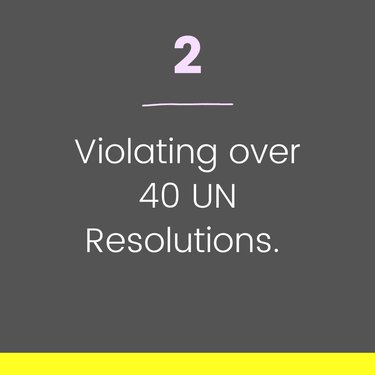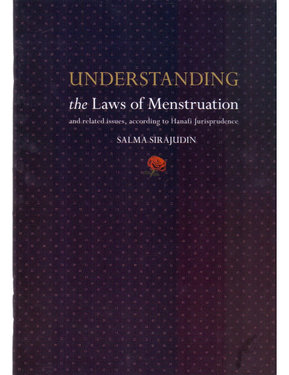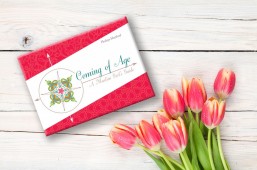-
Posts
8,434 -
Joined
-
Days Won
771
Content Type
Profiles
Forums
Events
Everything posted by ummtaalib
-
Habit Fluctuation One of the most important principles in the rulings regarding menstruation is habit. A woman’s habit is the number of days she normally menstruates, as well as where in the month she experiences her bleeding. For example, a woman has a 5-day bleeding cycle, followed by 20 days of purity. We would say her habit in menstruation (hayd) is 5 days and her habit in purity (tuhr) is 20 days. It’s completely normal to have fluctuations in one’s habit – it can change each month if the bleeding and purity remain in the allowed limits. For example, a woman bleeds 5 days, followed by 20 days of purity and her next menstrual cycle lasts 7 days, followed by 25 days of purity. These ups and downs are not only normal, and they do not effect the rulings. Habit comes into play when a woman experiences irregular bleeding (istihada) or has an invalid purity following her hayd. For example, a woman who previously bled for 6 days bleeds beyond the 10-day maximum, for a total of 12 days. In this situation of irregular bleeding, she reverts to her habit and considers the first 6 days hayd and the remaining 6 istihada. (Manhal al-Waridin pp.182-3) These simple examples highlight another crucial point – the accurate and consistent recording of instances of hayd and tuhr. Without knowing how long her previous hayd lasted, a woman will not be able to determine which days should be marked as hayd and which as istihada. The concept of habit is also important to applying rulings related to purity. For example, a woman regularly has 25 days of purity between her menstrual cycles, but following her last hayd she continued to spot indefinitely. Her tuhr habit will determine how many days she should treat as istihada before considering the spotting hayd. (Manhal al-Waridin pp.211-2) A woman should record the exact time her bleeding begins. She should monitor her bleeding throughout her hayd. When the bleeding ends, she should again note down the exact time. Keeping a log from cycle to cycle will help with determining rulings if any irregularities occur. Mudilla (Woman Without a Habit) Many women overlook the importance of keeping a written record of bleeding and purity, despite the directive from scholars. A woman who has no recollection or record of a valid blood and purity habit is referred to as a mudilla. Should a mudilla find herself in a situation of irregular bleeding, she can be subjected to some of the most stringent rulings in the Islamic law (Shari’ah). The Fiqh of It In his treatise on menstruation, Imam Birgivi writes that it is mandatory for every woman to know her menstruation (hayd), post-natal bleeding (nifas), and purity (tuhr) habit (Manhal al-Waridin p.229). The importance of this rule cannot be emphasized enough, as the consequences of not knowing are very serious. For example, if a woman is experiencing irregular bleeding (istihada) and does not have any written record of her habit, there is uncertainty as to whether the blood is hayd or istihada. She will be required to perform a ritual bath (ghusl) before every prayer (salat) and repeat the previous salat in each subsequent prayer time. Not only can this practice become extremely burdensome, it can create a negative disposition toward the prayer. Many other restrictions also apply to the mudilla. She cannot perform any optional fasts or prayers and her recitation of the Qur’an is restricted. It will also impact the ability of her and her husband to be intimate with one another. Therefore, women should be extremely diligent about recording their habits. Should a woman find herself in this situation, she should consult a knowledgeable and reliable scholar, who can guide her to the correct course of action.
- 11 replies
-
Colours Women experience variation in the colour and flow of menstrual blood – both convey important information regarding their health. While healthy menstrual blood ranges from dark red, brown, and even black, colours like grey and orange are indicative of a possible health issue, such as an infection. If a woman is concerned about changes in her cycle or the odour of her discharge, she should consult with a qualified medical professional. The Fiqh of It From an Islamic perspective, any coloured discharge in the habitual days of bleeding, other than clear or white, is considered menstruation (hayd). As long as the bleeding falls within normal parameters, colours such as black, brown, green, yellow and red are hayd. When looking at the colour of discharge, it is important that the sample is fresh and wet. If the discharge is looked at when it has dried, it has undergone a chemical reaction, altering its colour. For example, if the discharge is yellow when fresh, but changes colour after time, the original colour of yellow is considered. (Manhal al-Waridin p.169) Liners and pads may be used when bleeding. However, they cannot be used to determine the colour of the discharge, as they are placed away from the vaginal opening. Placing a piece of cotton at the point of exit (kursuf) can make it easier to accurately determine the colour of discharge. It allows for the colour of discharge to be seen when wet, before it undergoes a chemical change.
- 11 replies
-
Min & Max Time Frames A woman’s menstrual cycle can vary in length. On average, a woman menstruates for 3-8 days, and her subsequent purity can range between 21-28 days. These fluctuations are fine as long as they fall within the fixed limits established by Islamic law (Shari’ah). As a woman has her menstrual cycles, it is extremely important that she record the respective dates of any bleeding: menstruation (hayd), post-natal bleeding (nifas) and irregular bleeding (istihada). She should also write down her purity (tuhr) dates as a record for future reference. The Fiqh of It
- 11 replies
-

Depressed & Guilty for not Praying during Monthly Periods
ummtaalib replied to ummtaalib's topic in Fiqh of Menstruation
Please see HERE regarding this hadith -
Question I received the following as a broadcasted message, and would just like to know what is its authenticity: “Menstruation in Ramadan. It is related in a Hadith that Rasulullah (sallallahu ‘alayhi wa sallam) said if a woman reads (at her time of haidh – menstruation). Subhanaka astaghfirullahal lathi la ilaha illa huwal hayyul qayyum 70 times at the time of every Salah or any other istighfar even if it be astagfirullah only, then she will get the reward of reading 1000 rak’ahs of Salah, 70 of her sins are forgiven, her status is raised in the eyes of Allah and for every letter of istighfar, she gets a nur and for every vein in the body, one hajj and umrah is written!” (Majalisul Abrar) Answer I could not locate this in the popular Hadith books. The reference that is quoted in your query is not of a reputable primary Hadith-source. The promise of hugely inflated rewards for deeds that are relatively simple and easy is commonly found in fabricated Hadiths. (Tadribur Rawi) One should be cautious in sharing Hadiths like the above, especially since it cannot be traced to an authentic source. And Allah Ta’ala Knows best Answered by: Moulana Muhammad Abasoomar Checked by: Moulana Haroon Abasoomar Hadithanswers
-
Dar al-Uloom al-Arabiyyah al-Islamiyyah, Cape Town, South Africa is also a Shafiee Darul Ulūm - under Mufti Tāhā Karān DUAI | Home Submit a Question http://www.duai.org.za/fatawa.html
-
Advice on Teaching Daughters About Menses – Ustadh Abdus Shakur Brooks Question: How does a mother bring up the topic of menses to her daughter? Does she prepare her for what is going to happen and introduce the fiqh, or does she wait till she has her menses and then indirectly teach? Answer: Girls should generally be taught about menses before it occurs -without introducing technical matters of fiqh. A mother can introduce the subject to her by informing her that a day will come when she will see something called “menses”. She should explain to her what it is and why it happens a sign of her “growing up” and that when it occurs both angels on her right and left will begin to record her actions, thus Allah will have higher expectations of her; that she should pray, fast and wear hijab just like her mother. The mother must also inform her that she will have to stay away from boys and that Allah does not like her mixing with them. In general the mother needs to implant in her daughter’s mind and heart that seeing menses means a “great change in her life” that will make her a much more important in regards to her relationship with Allah and her religion. This will cause her to think about the coming of “the important day” which she will see as an interesting step in her life. The mother can also tell her a little bit about it before bed. This should be done randomly and not all at one time. A mother should also inform her that there are instructions that she will need to learn and that she will teach her in the near future. When she sees menses for the first time she will most likely come running to her mother overwhelmed and excited. At that point the mother should buy her (or already have bought) a little “special” calendar book and tell her to record the days of her menses. This type of teaching allows the girl to have her first responsibility for this “new beginning” she is experiencing. The point of giving her a calendar book and having her record her days of menses is to implant in her mind the importance of being responsible about this issue. The mother should inform her that when she is done bleeding that she should report back to her. When she tells her mother menses is done, the mother should teach her about the signs of indicate that menses is complete, and also teach her that her menses is now a fixed number of days based on the number of days she bled the first time. The mother should not forget to tell her to keep recording her menses every month and also to report back to her in any case when her blood stops before her fixed number of days or if it passes her fixed number of days. When the girl informs her mother about any of these cases then she should teacher her daughter the rules that apply to each situation such as the basics of what is covered in the Maliki fiqh text al-Akhdari. (You can listen to the course here and also listen to the course Menses & Postnatal According To The Maliki School). The mother should tell her to keep record these notes in her little book and she should also help her to do so. Following this type of education (tarbiyyah) will give the mother the ability to teach her daughter how to apply, and understand the general rules of menses without being “technical” until she gets a little older when she can learn from books. During the whole process the mother becomes like a practical guide for her. It is preferable that menstruation be taught by the mother before the father although if the father is a single parent then there is no doubt that he will have to teach her himself. Lastly just as the mother teaches her the rules of menses, she must also teach her about how to perform a proper ritual washing (ghusl). This is my advice. Allah knows best. Ustadh Abdus Shakur Brooks Reviewed and finalized 6/14/2011
-
Menstruation & Postnatal Bleeding In The Maliki School by Ustadh Abdus Shakur Brooks This is a six lesson audio course by Ustadh Abdus Shakur Brooks on the topic of menstruation and postnatal bleeding according to the Maliki school, based on two fundamental texts: Al-Akhdari and Al-Izziyah.This course will provide Muslim women with the fundamentals on how to deal with these matters with sound knowledge. Download the pdf : Menstruation & Postnatal Bleeding In The Maliki School (By Abdus Shakur Brooks) Part 1 : Part 2 : Part 3 : Part 4 : Part 5 : Part 6 : Share this:
-
Menstruation (Hayd) The literal definition of the Arabic term hayd is “to flow.” Legally, hayd refers to the physical blood that exits from the female body as well as the state of impurity a woman enters during the days of menstruation. Both prohibit her from specific ritual worship, such as fasting, prayer, and recitation of Qur’an. Practically, hayd is blood which originates from the uterus and exits from the vaginal opening. At a minimum, a threshold of 72 hours must be reached and a maximum of 240 hours is allowed to be hayd. This correlates to 3 days/nights and 10 days/nights. When the blood aligns within these parameters, it is classified as valid blood. (Sunan al-Daraqutni 406-7/1, Al-Tabrani 129/8) Post-Natal Bleeding (Nifas) The literal definition of nifas is to give birth. Legally, nifas is blood which originates from the uterus and exits from the vaginal opening during childbirth. Once more than half of the child has exited from the vaginal canal, the blood is considered nifas. While there is no minimum duration, nifas cannot exceed 960 hours, or 40 days/nights. (Sunan al-Daraqutni 410/1, Al-Mustadrak 283/1) Irregular Bleeding (Istihada) Istihada exits from the vaginal opening, but unlike hayd and nifas, it is considered an invalid blood. Practically, it is that blood which a woman sees for less than three days or for more than ten days, i.e. below the minimum or beyond the maximum of menstruation, or for more than 40 days after childbirth. When a woman experiences bleeding out of her norm, it is important that she review her bleeding record to determine whether it falls under the category of hayd or istihada. (Sahih al-Bukhari 55/1 & 68/1, Sahih Muslim 262/1)
- 11 replies
-
The content in this topic has been taken from Menstrual Matters Whitethread Institute. Menstruation is a part of every woman’s life. For a young girl, it will mark her entrance into womanhood and the point at which she is responsible for her worship in accordance with Islamic laws (Shari’ah). For a woman, it will be a constant part of her life, through monthly cycles, pregnancies and even menopause. Given the way hayd (menstruation) and nifas (post-natal bleeding) are so intimately connected to a woman, it is imperative that she understands the rules that govern them. She must know when she is obligated to pray and fast and when she must abstain from certain acts of worship. The tutorials aim to help women gain clarity and understanding of how to differentiate between the differnt types of bloods they experience. Index 1. Key Terms - it is very important to know the different types of blood women experience 2. Minimum & Maximum Frames - Shari'ah has stipulated the minimum and maximum limit to the bloods 3. Colours of blood - Women experience different colours of blood. This tutorial shows which colours can be considered 4. Habits - Habits are formed in the number of days a woman bleeds (in menstruation and post-natal bleeding) 5. Recording Cycles - This tutorial shows how imporatnt it is for women to record their cycles 6. Number & Place - It is not just about the number of days a woman bleeds. It is also at which place of the month she bleeds 7. Early Blood - Women's habits fluctuate and some months she may beging bleeding earlier than expeceted. What does she do? 8. Post-natal Bleeding (Nifas) - Definition and rulings 9. Miscarriage - Rulings on how to determine the bleeding after a miscarriage 10. Menopause - Rulings 11. Attaining Ritual Purity - How and when to attain purity aftre bleeding
- 11 replies
-
- 1
-

-
Why is the Ummah Suffering? by Maulana Yunus Patel (Rahmatullah alayhi) Many ask the question: Why is the Ummah suffering so much, despite millions making Dua throughout the world, millions making Dua during Haj and Umrah? Why is there no change? The answer can be understood by way of an analogy: A son is disobedient and rebellious towards his father’s instructions, arrogant in his stance against his father, demanding, swearing, abusing and adopting the bad behaviour as found common in this day and age. The father is deeply hurt, offended and angered and when he has had enough of the insolence and arrogance, he finally resorts to breaking off ties with his son. He cuts off all privileges. Now, if the entire family, even the entire community, tells that father: “Forgive him. He is your son…” That father will respond: “I have no problem with forgiving him. All he has to say is, “I’m sorry” and I will forgive him.” However, on being encouraged to humble himself and ask for forgiveness, the son retorts with arrogance: ‘Why must I? Why do I need to? I’m independent! I don’t need him!’ Then will that father forgive that son? Will he grant those privileges of money, car, etc.? Similarly, the friends of Allah, the Sawliheen (the pious) and so many more are making Dua for the Ummah. …In fact, if all the friends of Allah were to gather on the Day of Arafaat and earnestly pray for the Ummah, Allah Ta’ala will most assuredly be prepared to forgive. However, from our side, there is a step to be taken – and this is what the majority are not prepared to do: They are not prepared to take the step of “CHANGE”. Unfortunately, majority of us do not want to sincerely repent from our sins, let alone acknowledge them. Many justify and reason their sins, even dispute and argue regarding Allah Ta’ala’s Commandments, as if they have some kind of authority over Allah Ta’ala. So many are brazen in their indulgence in sins, as if challenging Allah Ta’ala, like that arrogant son: “What can You do? I’m not in need of You!” With this kind of behaviour and attitude, can we expect any favours, privileges or any kind of assistance from Allah Ta’ala? We are living in a fool’s paradise if we think that we can continue sinning and still be recipient of Allah Ta’ala’s bounties and aid. If we truly want Allah Ta’ala’s assistance, then we have to give up sins. Many, many are not even fulfilling the Fardh Injunctions – Salaah, Zakaah, Fasting in the month of Ramadaan, etc., and there are others who naively depend on wazeefas to solve their problems, not prepared to give up sins. This is sheer foolishness. Wazeefas and Taweez are no barrier against the punishment of Allah Ta’ala, when there is indulgence and persistence in sins. Then we have those Muslims who, in the face of natural disasters, war, genocide, etc. begin to question the existence of God or ask as to where is Allah Ta’ala’s Mercy and Compassion, or ask if He is seeing all that is happening. Allah Ta’ala is not blind or deaf. He does not want chaos. Allah Ta’ala wants peace. However we have to fulfill the conditions of the contract. The first condition is that we implement Deen in our lives, adopt Taqwa and follow the noble example of Rasulullah (Sallallaahu ‘alayhi wa sallam) then the conditions will change. The Day the Ummah fulfills its duties, across the board – making a total change, then our suffering will be replaced with success, prosperity and happiness and people of other faiths will also accept Islam. Allah Ta’ala explicitly spells out His conditions and His promises: “Allah has promised those among you who believe and perform righteous deeds, that He will surely grant them inheritance (of control) in the land as He granted it to those before them; that He will firmly establish their religion - the one which He has chosen for them - and that He will change their fear to one of security and peace.” [Surah Nur 24 ; V: 55] Thus, we will have to fulfill our pledge by making the effort to obey Allah Ta’ala and His Rasul (Sallallaahu ‘alayhi wa sallam), to see the fruit of our duas and receive the assistance of Allah Ta’ala – on an individual level, on a national level, and on an international level. Jamiatul Ulama (KZN) Council of Muslim Theologians
-
URGENT: Meet Your MP - Friends of Al-Aqsa (foa.org.uk) Write to your MP to meet you online On June 14th a debate has been scheduled in Parliament for MPs to discuss sanctions on Israel. FOA are calling on everyone to contact their MP’s to meet them (online) on Wednesday 9th June to: Ask MP’s to attend the June 14th debate and call for sanctions on Israel for breaking international law. If they are unable to attend, ask them to make a public statement which supports sanctions on Israel.
-

Books on Women's issues (Hanafi Fiqh)
ummtaalib replied to Bint e Aisha's topic in Fiqh of Menstruation
Tuḥfat al-Banāt by Jamiatul Ulama (KZN) A Muslim Girl’s Guide to Life’s Big Changes by Rayhana Khan -

Books on Women's issues (Hanafi Fiqh)
ummtaalib replied to Bint e Aisha's topic in Fiqh of Menstruation
A Woman’s Guide to Hajj & Umrah by Mufti Muhammad Faruq Women’s Hajj Companion by Maulana Ebrahim Noor -

Books on Women's issues (Hanafi Fiqh)
ummtaalib replied to Bint e Aisha's topic in Fiqh of Menstruation
-

Books on Women's issues (Hanafi Fiqh)
ummtaalib replied to Bint e Aisha's topic in Fiqh of Menstruation
Coming of Age – A Muslim Girl’s Guide At 300+ pages it is nearly an encyclopedic volume on physiological and fiqh issues related to puberty and menstruation. It is written only from the perspective of the Hanafi madhab, and does not cover emotional development during adolescence. The author, Hedaya Hartford, writes that the aim of this book is: “…young girls from the age of 8-13 will be able to understand this book with the help of an elder like her mother, aunt, or guardian, and for those 14 and older to be able to read it on her own.” Get a free 37 page sample -

Books on Women's issues (Hanafi Fiqh)
ummtaalib replied to Bint e Aisha's topic in Fiqh of Menstruation
-
Breaking the Silence Breaking the Silence › The Organization Breaking the Silence › The Organization Breaking the Silence is an organization of veteran soldiers who have served in the Israeli military since the st... Soldiers who serve in the territories witness and participate in military actions that change them immensely. Cases of abuse toward Palestinians, looting and destruction of property have been the norm for years, but these incidents are still described officially as “extreme” and “unique” cases. Our testimonies portray a different – and much grimmer – picture, in which the deterioration of moral standards finds expression in the character of the military orders and rules of engagement that the state considers justified in the name of Israel’s security. Breaking the Silence › Testimonies Breaking the Silence › Testimonies Breaking the Silence is an organization of veteran soldiers who have served in the Israeli military since the st...
-
The Fluctuating Heart It is inhuman and impossible to retain a high level of spirituality, imaan and awareness of Allah سبحانه وتعالى and these things will naturally fluctuate in a person. The reason the heart is called ‘qalb‘ in Arabic is because qalb means ‘to flip and change’ and the condition of the heart is constantly flipping and changing. Even the Companions felt like this on occasions as is illustrated by an incident reported by Imam Muslim. Once Sayyiduna Hanzalah رضى الله عنه was in the company of Rasulullah صلى الله عليه وسلم, but when he left and returned home he became preoccupied with his family. He thought he had become a hypocrite so he went to complain of his condition to Rasulullah صلى الله عليه وسلم. On the way he was shouting ”Hanzalah has become a munafiq (hypocrite), Hanzalah has become a munafiq.” He met Sayyiduna Abu Bakr رضى الله عنه to whom he related that when he was with Rasulullah صلى الله عليه وسلم it was as though Jannat and Jahannam were before him, but the moment he returned home he became preoccupied with his family, thus he feared hypocrisy for himself. Sayyiduna Abu Bakr رضى الله عنه replied that he also felt the same way so they both approached Rasulullah صلى الله عليه وسلم who comforted and informed them that such levels of imaan and spirituality are momentary and they do not last and that if they were to last the angels would have descended from the heavens and met them. This incident illustrates that imaan constantly fluctuates in a person. When a low level of imaan is experienced or one feels an attack on one’s spirituality and faith by shaytaan and other influences a person shouldn’t withdraw, but rather seek the remedy by adopting good company or entering into a pious environment where mention is made of Allah سبحانه وتعالى and His Rasul صلى الله عليه وسلم. Even if this is not possible one can listen to a talk at home. As a consequence, due to the blessings, one’s heart and faith will be strengthened, insha’Allah. Even Rasulullah صلى الله عليه وسلم would constantly pray, “O Transformer of the hearts,make my heart steadfast upon Your deen” [Reported by Tirmidhi].[This short excerpt is based on a brothers’ majlis (gathering for spiritual training) held by Shaykh Abu Yusuf Riyadh ul Haq on 18th April 1998]
-
Q. Who is the owner of gifts given to one’s children? (Question published as received) A) In the case of gifts given to a minor, there are a few rules that apply: 1) If a gift was given to the parents of the child for the ‘use of the child’, the gift belongs to the parents. In that case, the parents may use it as they wish. However, the parents should use it for the purpose and benefit of the child. 2) If the gift was given to the child as the child’s gift, the gift belongs to the child. The parents cannot do as they wish with the child’s gift. In that case, the gift must be for the sole use, purpose and benefit of the child. 3) If the gift is of no use or is not suitable for the child, the father (wali) of the child may purchase the gift from the child. In that case, the money from the gift purchased from the child must be kept for the sole use, purpose and benefit of the child. The money may also be invested or used for the expenses of the child. (Shaami 6/709) And Allah Ta’ala Knows Best Mufti Ismaeel Bassa Confirmation: Mufti Ebrahim Desai (The answer hereby given is specifically based on the question asked and should be read together with the question asked. Islamic rulings on this Q&A newsletter are answered in accordance to the Hanafi Fiqh unless otherwise stated.) Fatwa Department Jamiatul Ulama (KZN) Council of Muslim Theologians
-
Listen And Listen WellThe Gaza SongBy Mirza Yawar Baig Listen and listen wellO! One who could have been our brotherFor we are one people, whether you like it or notYou are a Semite, A son of Israeel (Issac)I am a Semite, A son of Ismaeel (Ishmael)Our father, the father of both you and IIs Ibrahim (Abraham)Or are you one who will even deny his own father?Listen and listen wellO! One who could have been our brotherWe will die on our feetBut we will not live on our knees.You know how to kill, but we know how to dieHitler gassed 6 million of you, but he could not kill your spiritThose who died only made stronger, those who remained aliveWhy then did you imagine that if you became HitlersThe results of your gassing would be any different?Listen and listen wellO! One who could have been our brotherJust as others silently watched you going into the gas chambersOthers silently watch us burying our children, the children that youcontinue to kill But we remind ourselvesThat the blow that does not break the back, only strengthens you.O! You who used to be the People of Musa (Moses),But today you have become people of the Firawn (Pharaoh)Remember we are the real people of Moses, for we, not you, believe inhis messageRemember that when the fight is between Moses and PharaohMoses always wins.We say to the silent watchers, the cowards,We say to those who sit securely in their homesWe are the front line who are holding back the enemyWhen we fall, it will be your turn.Remember O! ArabsThe story of the White Bull (Al Thawr il Abyadh)Who said to the world when the tiger finally came for himListen O! People, I do not die today,I died when the Black Bull died.Listen and listen wellO! One who could have been our brotherWe did not come into this world to live here foreverNeither did youOne day we will all go from hereWhether we like it or notWhat is important my brother, son of IsraeelSons of a Prophet, O! What have you become today?What have you allowed them to make you?Kill us, if that is what you want to doAt least we die at the hands of our own brothersAnd not at the hands of strangersListen and listen wellO! One who could have been our brotherWe laugh as we see your Apache helicopters and F-16 jets fly overheadWe laugh because we can smell your fearWhy else do you need Apaches and F-16s to fight children with rocks?A battle of honor is between equalsWe challenge you, you who have sold your honorCome to us as equals so that we can show you how to die with honorWe laugh at you because we know, that not in a million yearsWill one of you ever have the guts to stand up to one of our childrenWithout hiding behind an array of weapons that the American tax payergives youWe laugh at you, because that is what every warrior doesWhen he faces an army of cowards.Listen and listen wellO! One who could have been our brotherIt is not whether we live or die that is importantIt is how we live and how we dieAsk yourself: How would you like to be remembered?Without respect, despised and accursed through the centuries,Or blessed, honored, your passing mourned.Allah is our witness: We lived with honor; begging for no favorsAnd He is our witness: That today we die with honor, on our feetFighting until the last breath leaves our body, even if all we have in our hands are stonesHe is the witness over us bothAs you kill us and as we dieAnd to Him is our returnListen and listen wellO! One who could have been our brotherOn that Day, my little baby who you killed last nightWill ask Him for what crime she was murderedPrepare your answer, O! One who could have been our brotherFor you will answer to HimI swear by His Power: You will answer to Him.
-

Menstruation discussion for men
ummtaalib replied to ColonelHardstone's topic in Fiqh of Menstruation
Pandemic periods: why women's menstrual cycles have gone haywire A majority of menstruating women have experienced changes to their cycle over the last year, surveys suggest. One of the main culprits? Persistent stress. https://www.theguardian.com/society/2021/mar/25/pandemic-periods-why-womens-menstrual-cycles-have-gone-haywire Persistent stress leaves us suspended in fight-or-flight mode. In threatening situations, a hormonal pathway in the body called the hypothalamic-pituitary-adrenal axis, which links the brain with the adrenal glands, encourages the release of the stress hormone cortisol – preparing us to respond to the threat. However, if the brain is telling the body it needs to “respond” all the time (to anxious thoughts, changing circumstances, the stress of home schooling, the impact of loneliness, illness or bereavement), unregulated cortisol can suppress the normal levels of reproductive hormones in the body. This can lead to abnormal ovulation, which will disrupt the cycle – or even pause it altogether. For Muslim women whose cycles are affected by stress in this way, it can become serious simply because their manadatory acts of worship which require purity are affected. In this type iregular bleeding, previous habits are necessary to determine the stae of menstruation and purity












